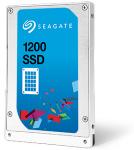storage history
how fast can your SSD
run backwards?
Decloaking
hidden preference segments in enterprise flash |
| . |
SMART proliferates adaptive DSP IP in SAS
SSDs
Editor:- July 5, 2012 - SMART Storage Systems
recently
announced
it's sampling yet another new variant of
SAS SSD which uses
adaptive
flash DSP technology - the
Optimus
Ultra+ is a 2.5"
SSD with 100K/60K R/W
IOPS - which
can endure
50 full random drive writes per day for a period of 5 years using commercial MLC
NAND flash technology.
Editor's comments:- This is SMART's 3rd
turn of the screw this
year already in leveraging its new controller IP in enterprise SSDs - and
the company has published various pretty graphs for editors, analysts and users
which identify the different sub markets and use cases within enterprise SSDs
where differing amounts of SSD write life can be economically and sustainably
deployed. (It's an SSD component maker's view of sites inside
enterprise SSD silos.)
More
guaranteed SSD writes generally mean more
cost - because - in
the limit - when all the write
attenuation tricks have been done - the extra endurance in classic flash
SSDs either comes from
overprovisioning
or RAM cache
which add to the component count. But for the pioneers in DSP enhanced flash IP
- a new degree of design freedom comes from applying new
flash care
tonic to change all
the rules.
Unlike human cures for baldness which are applied when the
symptoms start to appear - SSD
baldness cures have to be applied from birth - and the strength of the
tonic has to increase with age to get the best results.
I discussed
the business development opportunities of this new technology trend recently
with Mike
Lakowicz, SMART's - VP of Marketing.
Mike said that their
ideal customers for these enterprise SSDs are big oems where it can cost
millions of dollars to get products qualified.
SMART's
new controller technologies enable them to customize an SSD which matches
the performance, endurance and operating power needs of enterprise oems -
at any point in a wide spectrum of use cases - in a manner which is efficient
(lowest cost memory bill of materials) from the same core set of parts.
This sounds similar to what
STEC was telling me
about their CellCare
last year. But SMART's documents make what Mike called the "rational"
design rule choices along the SSD envelope much more explicit and easier
to focus in on.
To me - this seemed like a pragmatic and well
engineered set of marketing propositions for the type of customers that SMART is
aiming at.
So I asked again (I had asked SMART's President - John
Scaramuzzo earlier this year) what are their plans for designing a fast-enough
PCIe SSD using the DSP
technology?
Mike Lakowicz explained that the taxonomy of PCIe SSDs in
the market today wasn't clear. (I agreed - there are many different
types of
functionality in the PCIe SSD space - so it's hard for a new entrant to
decide which segment within PCIe SSD will work best as a sustainable business.)
Mike
explained that as a supplier of legacy compatible storage SMART would prefer to
see more stability and the emergence of clear standards within the PCIe SSD
market before they launch any such product.
I said to Mike that I
thought their VC owners should be happy with what SMART was doing - because
even discounting their SSD products - it was clear that within the
SSD controller market
- the new adaptive DSP technologies were going to attract a premium value once
enough analysts understood how this technology could permeate the SSD market.
But I also warned that in 2-3 years every flash SSD company would be using this
type of technology.
To which Mike replied - that companies like SMART
which has already been using this technology for several years - would still
have an advantage over those who were coming in with their first products at the
20x endurance level - for example.
OCZ's PCIe SSD software + MS SQL Server 2012 - paper
Editor:-
July 3, 2012 - OCZ
published a white paper today -
Accelerating
MS SQL Server 2012 with OCZ Flash Virtualization (pdf) which describes
the performance of the company's
PCIe SSDs (Z-Drive R4)
and its
VXL
caching and virtualization software in this kind of environment.
The
interesting angle (for me) was in the aspect of
SSD fault
tolerance rather than the 16x VM speedup.
The paper's
author Allon Cohen
(who has written many thought provoking
performance blogs)
explains in this paper - "VXL software has a unique storage virtualization
feature-set that enables transparent mirroring of SQL Server logs between 2
flash cards, thereby assuring that the log files can be accessed with ultra high
performance, while at the same time, are highly available for recovery if
required." ...read
the article (pdf)
StorageSearch.com pageviews grew 40%
Editor:- July 2,
2012 - there was a 40% increase in SSD article pageviews on StorageSearch.com
in June compared to a year ago. That's despite the fact that I've given a lot
more visibility recently to difficult subjects within the SSD landscape.
Thanks to everyone who reads the site and the many of you who also
tell me things I've missed out and things you can't find. (Even if they are
sometimes there - but in a different place.) | |
| . |
 | |
|











